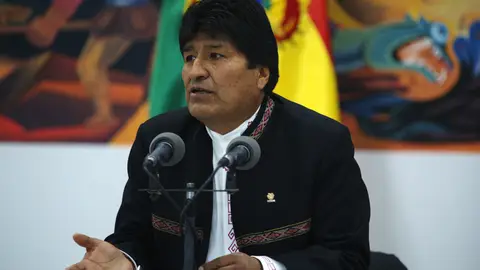Bolivia's President Just Stepped Down — Here's What You Need To Know

President Evo Morales of Bolivia stepped down on Sunday (November 10), amid protests demanding his resignation in the wake of a highly contested election. Nearly every person constitutionally in line to take over the presidency — including Vice President Álvaro García Linera, the Senate president, the head of the lower house, and the head of Bolivia's Supreme Electoral Tribunal — also stepped down.
Morales, the first member of Bolivia's Indigenous population to become president, came to power in 2006, making him Latin America's longest-serving leader. He had once been deeply popular among Bolivians, according to the Associated Press. So his resignation came with mixed reactions, from celebrations to reports of violence, in some part because it marked the potential end to the “pink tide” of left-leaning governments in Latin America, Al Jazeera reported.
While Bolivia once allowed two terms for a presidency, Morales pushed to change the law so that presidents could run for an indefinite amount of terms; while Bolivians voted against the referendum in 2016, lawmakers approved the change one year later. The October 20 election marked his bid for a fourth term in office, after leading the nation through a fairly successful time of economic growth and shrinking inequality, according to the New York Times.
“I want to tell you, brothers and sisters, that the fight does not end here,” the socialist leader said from his stronghold in the Chapare region in central Bolivia, according to Al Jazeera. He called himself the victim of a “coup” and said on Twitter that police issued an “illegal” warrant for his arrest.
“We will continue this fight for equality, for peace,” he added.
Morales’s resignation comes after weeks of deadly protests from citizens who disputed the President’s right to run for a fourth term, despite his popularity. In October, the Organization of American States (OAS) released a report of an audit of the October election, and recommended that the vote should be annulled due to “serious security flaws” and a “clear manipulation” of the count that left Morales with a 10 point majority over his primary opponent. The report recommended that the country should hold new elections, this time with a new electoral commission. On early Sunday (November 10), Morales said he would accept the recommendation, and even said he might not run for reelection in that vote, according to the Washington Post. But apparently that statement didn’t come soon enough — the President announced his departure from his post a few hours later.
Bolivian lawmakers are now working to figure out the political future of the country, according to the Associated Press. An opposition lawmaker, Jeanine Añez, said that she would assume the interim presidency, but she’d need congressional approval, and Morales’s party controls both houses of Congress, the Times reported. Experts told the Associated Press that such a conflict leaves space for the military to step in.
The unrest in Bolivia has caused a mix of reactions from other Latin American countries — including Mexico and Argentina. UN Secretary General Antonio Guterres told Al Jazeera that he was deeply concerned about the situation. His spokesperson, Stephane Dujarric, said Guterres “urges all relevant parties to refrain from violence, reduce tensions and exercise maximum restraint.” U.S. officials released a similar statement to Reuters.





